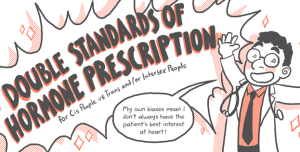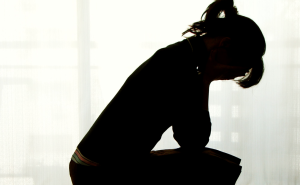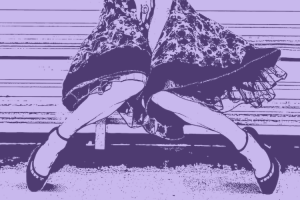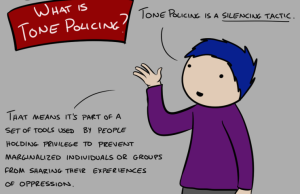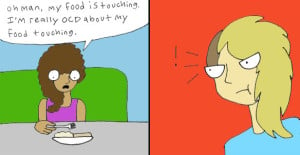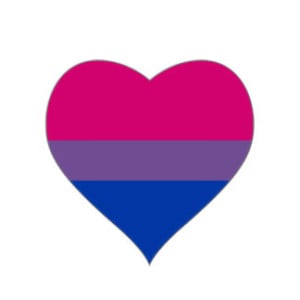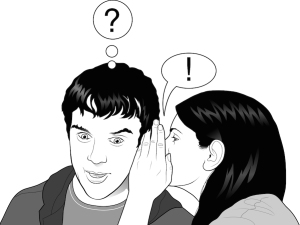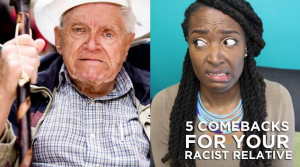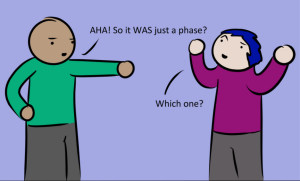
Our daughter is Autistic. She’s also (as far as she currently identifies) female.
With the right accommodations and supports, she can have everything she wants out of life – but there’s a lot to do as parents between now and adulthood.
So how do we go about raising a confident young woman in an ableist world?
I think that the answer lies at the intersection of supporting feminism and destroying ableism – the juncture at which positive body image, comprehensive sexual education, personal autonomy, and societal critiques join to empower our Autistic children.
For us, as our daughter is still young, that empowerment has started with body positivity.
Sometimes my daughter’s body doesn’t do what she needs it to do, and those times are the most frustrating for her, especially when it attracts the unwanted attention of others.
I can’t overstate the importance of body-positive attitudes in our situation.
I am very careful never to criticize my own weight or appearance, make comments about my “need” for makeup in front of her, or idealize my dream body type in front of her.
When she’s already hearing negative ableist comments about how her body is moving, the last thing she needs to internalize is an artificial construct of beauty.
I can’t control other people, but I can and must control my own self-smack talk.
Part of that body positivity comes from teaching a sex-positive attitude as well.
We have to presume that she will want to enjoy an active sex life and not infantilize her because of her disability.
At nearly five, she’s too young for the heavy talks, but we have to consider sensory and language matters as well.
When we talk about it later, we feel we owe it to her sensory processing differences to be honest: sex is sticky and sweaty. Sometimes it smells funny.
Preparation is a positive, healthy thing and no question or bit of information will be off-limits to her.
Making that education accessible to her is paramount.
The highly literal side of her Autistic language processing means that euphemisms are out of the question, and empowering her with total clarity is required. None of this “birds and bees” nonsense: a vulva is a vulva. No one but her has a right to touch her body. Period.
Let’s recap. Concrete rules, literal speech, no shame, and most importantly: her consent.
Our daughter is verbal, but when she is under stress, her speech evaporates or becomes echolalic (scripted from pre-memorized dialogue, the relevance of which may not be immediately obvious to the listener).
Later on, she may be in a situation where nervousness or stress means she cannot speak to say what she needs or wants.
That will mean she will need to have the sex-and-body-positive confidence to speak with or write about her needs to partners (whichever means of communication feels best for her) before entering a physical relationship.
She will know that “no” can be said in body language as well as speech, because in our home, that method of communication will be respected.
For that to happen, we need to lay the groundwork by honoring her right to say no, set her own boundaries, and not override her autonomy with our wishes.
That means I can’t say things like “I’m taking your pajamas off for you if you won’t get dressed! We’re running late!” Nope. Her body, her terms.
We also completely reject any autism therapies that rely on total behavioral compliance. Teaching total compliance is a threat to her body and her autonomy, and if that means she knocks heads with a few teachers or other authority figures down the road, so be it.
We have her back. Always.
Of course, the messages she gets at home differ from the rest of the world, and she’s growing up in the information-overload age.
Her sarcasm filter is developing differently. That means heavily filtering her media intake (super-snarky cartoons: out), being incredibly careful about our own language, and starting to think really critically about ableist macro- and micro-aggressions.
What are ableist aggressions?
Until her diagnosis, we never thought about how condescending it feels to be part of disability inspiration porn. We hadn’t given much thought to accessibility issues that go far beyond just having an elevator or wide doors. What about flash photography, auto-playing video on websites to those with auditory triggers, workplaces that allow triggering scented candles or perfumes, or people presuming my child is incompetent because she doesn’t communicate in a “normal” way?
What about the pain inherent in the word “normal” (implying the converse “abnormal”) itself, let alone actual ableist language like “lame” or “retarded” being slung as casual, unchallenged insults?
When our girl is just trying to go about her business at school or the store without experiencing a sensory onslaught, which of society’s ableist attitudes might come and tip her balance?
I didn’t wonder before. I didn’t check myself. I do now.
We are still learning about ableism and the extent of our privilege. There is so much that we don’t yet know about ableism, but to do right by our daughter and her culture (Autistic culture is real, and it is awesome) has meant checking our pride at the door and being willing to be told what we’ve done or are doing wrong – just like classism, feminism, racism, or any category where we once-unwittingly experienced the benefits privilege.
Everything I learned about analysis, privilege-checking, and examining society through feminism applied to ableism and helped inform our decisions about our daughter and her treatment.
Feminism gave me the tools to start dismantling my own ableism to be a better parent for my disabled daughter – and, I hope, the ability to make the world a little kinder to her.
Want to discuss this further? Login to our online forum and start a post! If you’re not already registered as a forum user, please register first here.
Deanna Niles McConnell is a mom, expat, traveler, and occasional writer. She writes about autism, parenting two hilariously strong-willed young girls, and ridiculous hotels at Traveling Monkeys.
Search our 3000+ articles!
Read our articles about:
Our online racial justice training
Used by hundreds of universities, non-profits, and businesses.
Click to learn more





